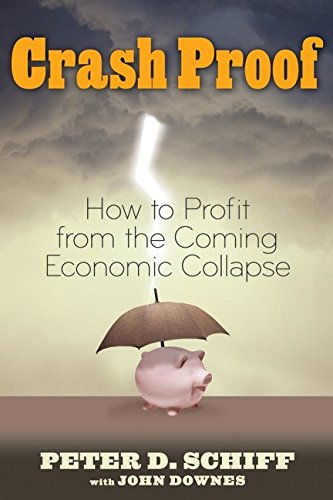Recently by Peter Schiff: Less Government or Lower Wages? YouDecide.
After having given away billions faster than even the optimists had anticipated, it was announced today that the federal government’s "Cash for Clunkers" program is coming to an early end. But, based on the standards of economic analysis which prevail in Washington, Wall Street and academia, the program must be considered a master stroke of public policy. These experts will tell you that by mandating that citizens destroy older (but still working) vehicles to receive $4,500 toward the purchase of a new car, the program not only revved up the economy by encouraging Americans to borrow more, but it may have, perhaps, made some great strides in saving the planet by reducing carbon emissions.
With this solid win-win now on the books, the time has come to put the strategy to work in other areas. For instance, the government could use these lessons learned to help the moribund housing sector. I propose the "Dough for Dumps" stimulus program. Here’s how it would work:
Homeowners struggling to make payments on environmentally inefficient homes can apply for government aid to destroy their old homes and receive guaranteed loans to buy newly constructed houses, provided they are furnished with the latest "green" advancements in energy systems and building materials. As with the "Cash for Clunkers" program, this plan would solve many problems at once.
First, it will help put a floor under falling home prices by reducing the glut of houses currently on the market. The best way to stop prices from falling, and thereby reduce the foreclosure wave, is to reduce supply.
 The Little Book of Bul...
Best Price: $0.05
Buy New $1.99
(as of 05:25 UTC - Details)
The Little Book of Bul...
Best Price: $0.05
Buy New $1.99
(as of 05:25 UTC - Details)
Left alone, the market would do this by lowering prices, which would bring more buyers into the market. But this approach falls on the back of homeowners whose only crime was to overpay for a house. A more socially equitable method would be for all taxpayers to shoulder the burden through a government bulldozing program.
In addition to contracting the supply of homes, the program would also stimulate the economy by providing funds to hire environmentally savvy builders and contractors (not to mention the workers needed to demolish the old homes). The resulting demand would help to reduce unemployment, especially in the housing sector. Government incentives and subsidies could also give an important boost to the developers and manufacturers of "green" windows, solar heating systems, furnaces and water systems.
Once this program has rejuvenated the real estate market, citizens should also be encouraged to burn their old furniture and clothing, thereby sparking demand for new goods from our nation’s struggling retailers. When you think about it, the possibilities are endless.
If these proposals seem ridiculous, it is because they are. But they are no less ridiculous than the "Cash for Clunkers" program that inspired them. All are examples of the "broken window" fallacy of economics, which argues that economic activity can be stimulated by the need to replace something that has been destroyed.
 Crash Proof: How to Pr...
Best Price: $0.10
Buy New $8.99
(as of 12:00 UTC - Details)
Crash Proof: How to Pr...
Best Price: $0.10
Buy New $8.99
(as of 12:00 UTC - Details)
Unfortunately, many of our "best" economists subscribe to the notion. But society gains nothing from redundant activities. Digging holes just to fill them up does employ workers, but the work offers no benefit to anyone not receiving the wage. Absent government incentives, such a job would create no profit and could only exist as a result of a subsidy from someone else. Such work also prevents workers from accomplishing tasks that create real wealth and actually benefit society.
In the case of "Cash for Clunkers," the government provided an incentive for citizens to destroy otherwise working assets, fully owned by their users, in exchange for a smattering of "green" tech and a lot more debt. Could anyone look at our country now and determine that our problems stem from a lack of new cars? Given our level of economic output, it is likely that we already have too many cars. On the other hand, it should be obvious to anyone that American consumers are already burdened by too much debt. The program distorts the market by giving car owners a powerful incentive to take out new loans for cars they may not need.
The environmental benefits of the program are much more difficult to quantify and extremely unlikely to overcome the waste inherent in the wanton destruction of working assets. On a practical level, the premature shelving of working cars will add extra pressures to our waste management capacity, and create emissions and pollution through the compaction/incineration processes that accompanies disposal. On an abstract level, this program punishes every consumer who sought to be ahead of the curve in environmental responsibility by using their own resources to upgrade a clunker. Some may think twice before making such a move without government money on the table.
More fundamental however is the question of making wise decisions in a recession. Given the fragility of our finances, we should use our resources wisely, pay down our debt, replenish our depleted savings, and make investments in time and energy that offer a tangible benefit. The "Cash for Clunkers" program is the exact opposite of what we need and a glaring example of the lack of economic understanding currently on tap in Washington.





